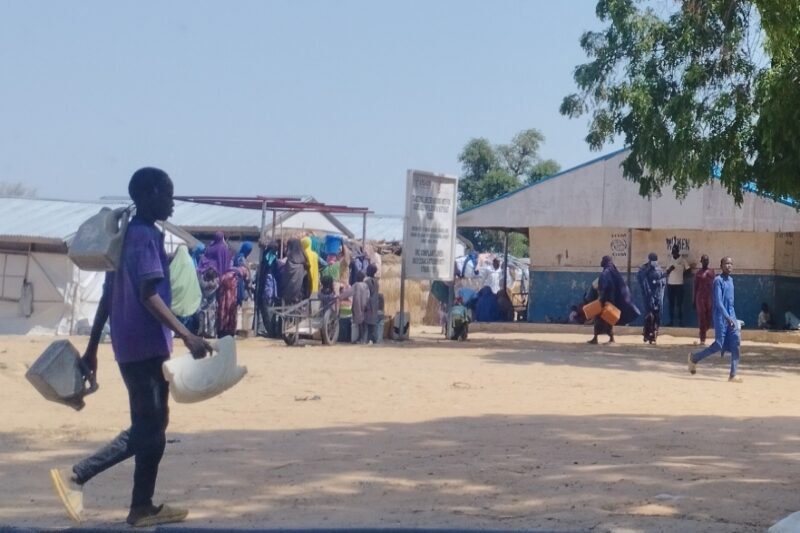Repentant insurgents, at first deeply distrusted by ordinary inhabitants of Borno State in Nigeria’s northeast, are starting new lives and finding love and acceptance – even marrying and having children with the widows whose husbands they helped to kill while they were active fighters.
It’s a dream come true for many penitent insurgents – and a happy ending for the widows.
The insurgency has lasted for more than a decade and resulted in massive destruction and disruption of lives, with about 2.2 million people being displaced. The worst hit was Borno State, the epicentre of the extreme violence.
The United Nations Development Programme (UNDP) has said that nearly 350,000 people were killed. Hundreds, if not thousands, of women and girls were raped, schoolchildren and adults were abducted and whole towns and villages were often taken over and trashed by insurgents.
In an effort to end the fighting, the Nigerian government and the military established Operation Safe Corridor in 2016 which was aimed at encouraging the repentance and mass surrender of insurgents. The government claims more than 80,000 insurgents have surrendered and says the number increases daily.
As part of the operation, penitent insurgents have to go through rehabilitation processes, which include deradicalisation, before they can be reintegrated into society.
One of the key objectives of Operation Safe Corridor and the Demobilisation, Disassociation, Reintegration and Reconciliation process is to contribute to security and stability in post-conflict environments so that recovery and development can begin.
Many ordinary people in Borno state – as well as those in Adamawa and Yobe states – were deeply troubled by Operation Safe Corridor. The overall feeling was that the very people who had caused so much destruction and harm in their lives would be allowed back into society.
They would be living side by side with former fighters who had committed abhorrent acts against them. People were distrustful and disbelieving, thinking the “so-called penitent insurgents” could easily revert to their violent ways and they would be killed and displaced again.
They found it difficult to forgive, accept and adjust.
It took numerous meetings with government officials, representatives from the military, community and religious leaders, as well as traditional rulers, to convince ordinary folk to understand that the only way sustainable peace and stability could be achieved was to forgive their enemies and allow the reformed fighters back into their lives.
Gradually, perceptions started changing and the locals, including internally displaced persons (IDPs), began to accept the rehabilitated insurgents and even welcomed them back into their communities.
Now some displaced widows – often the real victims of the insurgency because not only were they chased from ancestral homes, but they also lost their husbands – in Muna IDP camp in Maiduguri have found love again, this time with penitent insurgents. Some have married their former foes.
Modu Judum, a 32-year-old repentant insurgent, told RNI that he used to be an active member of the Jamā’at Ahl as-Sunnah lid-Da’way Wa’l-Jihād (JAS), better known as Boko Haram. He spent almost seven years in the bush before he decided to repent and surrender.
“I went through the deradicalisation and rehabilitation processes and was reintegrated into society a year ago. The host community accepted me. They have never maltreated or humilitated me.
“I do not regret denouncing my former ways and I am living peacefully among those around me. I am so grateful that they do not despise me and have not shunned me. Everyone knows and accepts that I am a changed person with a new life.
“The best thing is that I am now happily married to a displaced woman within the host community [Muna IDP camp] and I’m not the only one. There are at least 15 other repentant insurgents in the camp who have married displaced women.”
Judum said peace, unity, love, affection, trust, care and tolerance were key in a good marriage and that he had never been so happy. He called on active insurgents still fighting in the bush to lay down their arms, repent and surrender.
“That is the only way to live in peace, harmony and unity.”
Falmata Umar, a 40-year-old displaced widow, said she had been in Muna camp for almost six years. Her husband had been killed by insurgents and she had nowhere else to go.
“I’m originally from Boboshe town in the Dikwa Local Government Area of Borno State. After we were attacked and my husband was killed, we fled to Maiduguri. To my surprise, I have now found love again. I married a penitent insurgent. We are truly in love and he is looking after me and my children. We are fully committed to each other.
“I don’t care what people say about my new husband because I know him very well. He sincerely regrets what he did while he was with Boko Haram. He has repented. Even my relatives supported my decision to marry him. They accept him as one of our own. We all believe it was the path destined by Almighty Allah.”
Falmata said both young and elderly women had married repentant insurgents and they were living happily and peacefully together.
Another displaced widow, who asked to remain anonymous, said she was not forced to marry again.
“It was my choice to marry a penitent insurgent. We love and care for each other. But it took courage, patience, resilience and perseverance because it is not easy for widows to marry former fighters. We got married a year ago. We are happy and in love. In fact, Almighty Allah has blessed us with a baby boy.”
SHETTIMA LAWAN MONGUNO









